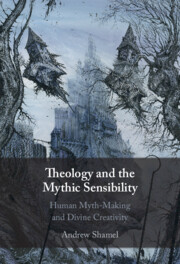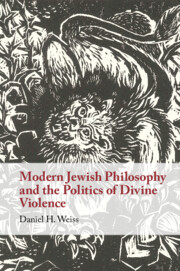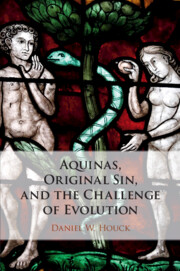Refine search
Actions for selected content:
11 results
16 - Theological Responses to the Holocaust
- from Part III - Culture and Ideas
-
-
- Book:
- The Cambridge History of the Holocaust
- Published online:
- 16 May 2025
- Print publication:
- 12 June 2025, pp 374-397
-
- Chapter
- Export citation
6 - Artificial Intelligence and Christianity
- from Part I - Religions and AI
-
-
- Book:
- The Cambridge Companion to Religion and Artificial Intelligence
- Published online:
- 20 November 2024
- Print publication:
- 21 November 2024, pp 88-108
-
- Chapter
- Export citation

Theology and the Mythic Sensibility
- Human Myth-Making and Divine Creativity
-
- Published online:
- 07 November 2024
- Print publication:
- 21 November 2024

Learning from Other Religions
-
- Published online:
- 30 October 2023
- Print publication:
- 16 November 2023

Modern Jewish Philosophy and the Politics of Divine Violence
-
- Published online:
- 30 March 2023
- Print publication:
- 06 April 2023
Chapter 2 - The Nineteenth-Century Origins of the Problem
- from Part I - Modern Historians on ‘Science’ and ‘Religion’
-
-
- Book:
- After Science and Religion
- Published online:
- 05 May 2022
- Print publication:
- 19 May 2022, pp 35-58
-
- Chapter
- Export citation
14 - Process Theology and a Pluralistic Foundation for Human Rights
-
-
- Book:
- Christianity and International Law
- Published online:
- 17 May 2021
- Print publication:
- 20 May 2021, pp 281-316
-
- Chapter
- Export citation

Aquinas, Original Sin, and the Challenge of Evolution
-
- Published online:
- 22 February 2020
- Print publication:
- 12 March 2020
24 - Monotheism and creation
- from Part V - The Shaping of Christian Theology
-
-
- Book:
- The Cambridge History of Christianity
- Published online:
- 28 March 2008
- Print publication:
- 19 January 2006, pp 434-451
-
- Chapter
- Export citation
10 - Self-definition vis-à-vis the Jewish matrix
- from Part III - Community Traditions and Self-Definition
-
-
- Book:
- The Cambridge History of Christianity
- Published online:
- 28 March 2008
- Print publication:
- 19 January 2006, pp 214-229
-
- Chapter
- Export citation
17 - Plotinus
- from III - Plotinus and the new Platonism
-
-
- Book:
- The Cambridge History of Philosophy in Late Antiquity
- Published online:
- 28 May 2011
- Print publication:
- 01 January 2000, pp 301-324
-
- Chapter
- Export citation
